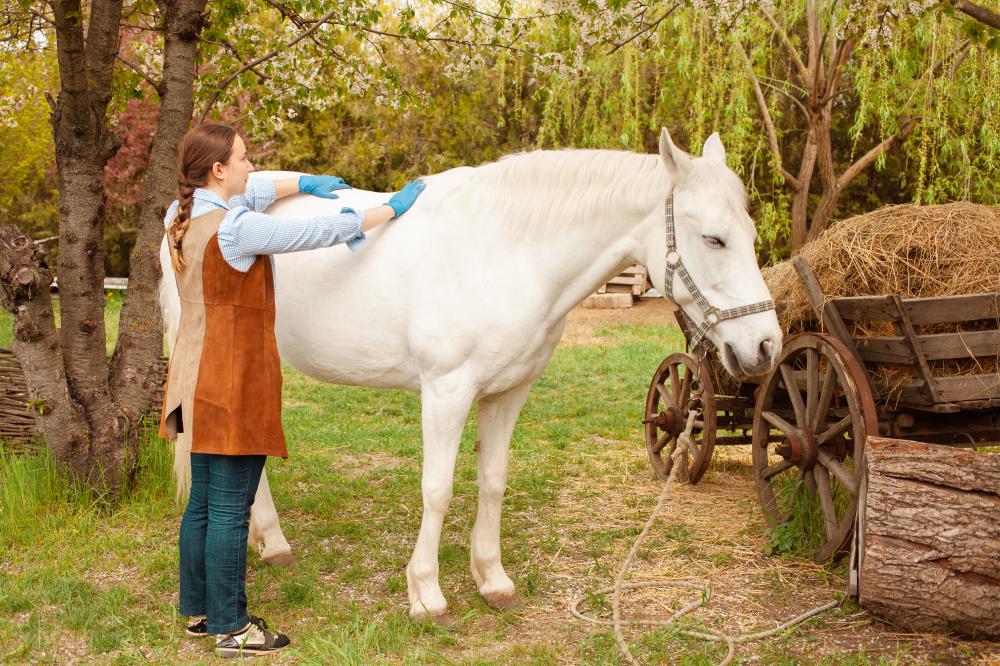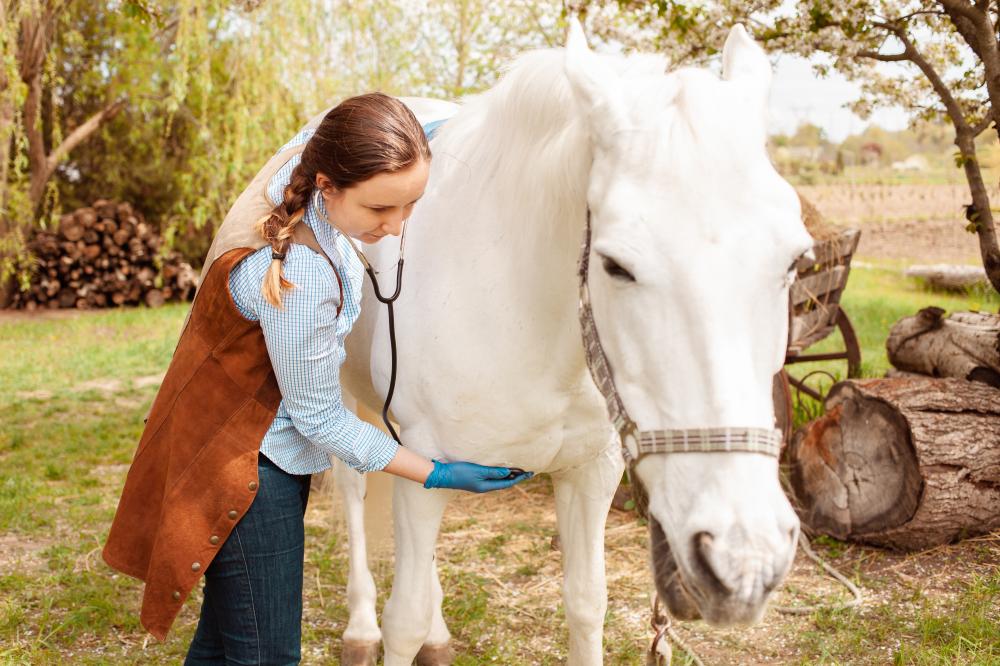Visit Us
Get Directions
With the equine therapy programs at Benchmark, seeking help for your substance abuse has never been easier. Whether you prefer…

At Benchmark Transitions, we’ve witnessed the profound impact that Equine Therapy Programs can have on individuals struggling with addiction and mental health issues. This unique form of therapy, while not new, has garnered significant attention for its effectiveness in promoting healing and recovery. Embracing the therapeutic power of horses, these programs offer more than just a novel experience; they offer a chance for transformation.
The core principle of equine therapy programs is the utilization of horses to foster emotional growth and personal development. Horses are incredibly attuned to human emotions, making them perfect partners in the therapeutic process. By caring for and interacting with these animals, clients often uncover parallels between their experiences with the horses and their personal lives. As they navigate these relationships, clients learn invaluable skills such as nonverbal communication, assertiveness, problem-solving, and trust-building.
We at Benchmark Transitions understand that each interaction with a horse can mirror the challenges our clients face in their own lives. By learning to lead and engage with these magnificent creatures, those in our care often uncover new pathways to self-discovery and healing.
Each equine therapy program is tailored to the specific needs of its participants. Typically, a session involves various activities such as grooming, feeding, leading, and riding under the guidance of experienced therapists and equine specialists. These interactions are structured to elicit emotional responses and insights, which are then processed with the help of a mental health professional.
At Benchmark Transitions, equine therapy is not a stand-alone treatment; it’s integrated into a broader therapeutic plan that may also involve individual and group therapy, substance abuse education, and life skills development. This multilayered approach ensures that our clients receive comprehensive care, addressing the multiple facets of addiction and mental health recovery.
Equine therapy programs are not just about spending time with horses; they’re about achieving tangible therapeutic goals. Clients often see improvements in areas such as emotional regulation, empathy, and impulse control. These benefits extend beyond the therapy sessions, influencing our clients’ relationships and their approach to life’s challenges.
In our years of service, we’ve seen equine therapy help in reducing anxiety, easing depression, and mitigating the effects of trauma. The horse’s non-judgmental presence can create a sense of calm and safety, allowing clients to explore difficult emotions in a supportive environment.
But the benefits don’t end there. Equine therapy also promotes physical health. Activities such as riding can improve balance, coordination, and physical strength, all while providing a joyful and liberating experience.
One client, who had been battling severe anxiety, shared with us that the moment they brushed the horse’s coat, their worries seemed to dissipate. It was as if the horse absorbed their fears and in exchange offered a sense of peace. These personal stories exemplify the transformative power of equine therapy programs.
Another young adult in our program found a parallel between the patience required to work with horses and the patience needed to mend strained family relationships. During the equine therapy sessions, they learned to approach their family as they did the horses–with calmness, respect, and clear communication.
The moments of connection with these gentle giants often become turning points in our clients’ recovery journeys, teaching them lessons that are carried into their daily lives.
Equine therapy programs come in various forms, each serving different therapeutic purposes. Therapeutic horseback riding, for instance, often focuses on physical rehabilitation, while hippotherapy employs the horse’s movement as a treatment strategy. Equine-assisted learning and psychotherapy, on the other hand, emphasize personal development and emotional healing.
At Benchmark Transitions, we recognize the need for diverse approaches. By incorporating equine therapy into our comprehensive treatment plans, we can address the specific challenges our clients face, whether it’s addiction, PTSD, depression, or other mental health issues.

Equine therapy programs, while powerful, are most effective when part of a holistic treatment strategy. For instance, pairing equine therapy with cognitive-behavioral therapy can provide insights into behavioral patterns that might otherwise remain hidden. The horses act as a mirror, reflecting back the emotional states and behaviors of the clients, which therapists can then work through in talk therapy sessions.
We ensure that the insights gained from equine therapy are woven into each client’s overall treatment plan. This approach allows for continuous progress, as clients apply lessons learned from their equine experiences to other areas of recovery.
Our equine therapy programs are designed not just to support recovery but to promote a deeper understanding of self. The clarity gained can be a catalyst for lasting change, propelling our clients towards a healthier, more fulfilled life.
“The horses taught me to be present,” says a former Benchmark Transitions client. “In their presence, I couldn’t hide behind my usual defenses. It was a raw and honest experience that played a huge role in my recovery.”
Many testimonials echo this sentiment, highlighting the clear and powerful impact that equine therapy programs have on those striving to overcome the challenges of addiction and mental health disorders. These narratives serve as beacons of hope, illuminating the path for others seeking a way forward.
As the demand for holistic and innovative treatment methods increases, equine therapy programs continue to evolve. Research into their efficacy is growing, solidifying their role in the therapeutic landscape. At Benchmark Transitions, we remain dedicated to exploring and incorporating these advances, ensuring that our clients have access to the most effective treatment modalities available.
Through dedication to our mission and the development of novel approaches, equine therapy programs promise not only betterment for our clients but also a broadening of the horizons for the field of psychotherapy.

The ultimate goal of any therapy is to foster skills and insights that extend beyond treatment settings into clients’ everyday lives. Equine therapy programs, with their unique ability to impart profound emotional and behavioral lessons, are particularly adept at preparing individuals for the journey ahead.
At Benchmark Transitions, our commitment to our clients does not end when the program does. We strive to equip each person with the tools and experiences they need to navigate the complexities of life with resilience and grace–a journey undoubtedly enriched by their time with the horses.
Supporting equine therapy programs is a way to extend the healing reach of these services. Through donations, volunteering, or simply spreading the word, every effort helps ensure that this life-changing therapy remains accessible to those in need.
Your involvement can make a significant difference in the lives of individuals embarking on their healing journeys. At Benchmark Transitions, we invite you to join us in this mission of recovery and renewal.
Becoming an equine therapist in the US requires a blend of specialized education and hands-on experience. Firstly, you’ll need a foundation in mental health or a related field — this often means obtaining at least a bachelor’s degree in psychology, social work, or a related discipline. Subsequently, you should pursue specific equine-assisted therapy training, which includes learning various modalities of equine therapy, equine care, and safety protocols. Certification through respected bodies such as PATH Intl. (Professional Association of Therapeutic Horsemanship International) or EAGALA (Equine Assisted Growth and Learning Association) is highly recommended. These certifications require completing a certain number of hours of hands-on experience, attending workshops, and demonstrating proficiency in equine-assisted therapy techniques. At Benchmark Transitions, we value the expertise of certified equine therapists who bring both passion and professionalism to their work, ensuring the highest quality of care for our clients.
Equine therapy encompasses a range of programs, each tailored to specific therapeutic needs. Therapeutic horseback riding, for example, focuses primarily on individuals with physical, emotional, or developmental challenges, using the rhythm and movement of the horse to create therapeutic experiences. Hippotherapy is a more specialized physical, occupational, or speech therapy where the horse’s movement is a critical part of treatment. Equine-assisted learning (EAL) centers on personal development and team-building activities, while equine-assisted psychotherapy (EAP) delves into addressing psychological and behavioral issues. At Benchmark Transitions, we’ve seen firsthand how these varied approaches can be harnessed to support growth and healing across a spectrum of mental health and addiction recovery scenarios, often yielding profound and lasting change.
From our extensive experience at Benchmark Transitions, we firmly believe equine therapy is worth it. The connection between humans and horses has a unique way of fostering personal insights that traditional therapy settings may not always provide. Equine therapy promotes emotional growth, self-awareness, and the development of trust and communication skills. It offers an experiential form of learning that can complement and enhance more traditional therapeutic modalities, often leading to breakthroughs that can be transformative on the path to recovery. Seeing the progress in our clients, from improved emotional regulation to a rekindled sense of joy and purpose, reaffirms the value of incorporating equine therapy into our treatment plans.
Equine therapy can be an investment in one’s mental health and wellbeing. The cost varies widely depending on the program, region, and frequency of sessions. Some factors that contribute to the cost include the expertise of certified therapists, the care and maintenance of the horses, and the facilities provided. However, at Benchmark Transitions, we strive to make therapy accessible and often include equine therapy as part of a comprehensive treatment plan. We’re committed to providing value to our clients and frequently explore options such as insurance coverage, sliding scale fees, or scholarships to ensure that those who can benefit from equine therapy have the opportunity to do so.
The equine therapy process at Benchmark Transitions is designed to promote healing and personal development. On arrival at the stable, our clients are matched with a horse that complements their personality and therapeutic needs. Under the guidance of certified professionals, they engage in activities such as grooming, feeding, and riding, which are all geared toward achieving specific therapeutic goals. As clients work through the program, they encounter challenges, experience emotional responses, and build connections with the horses. These experiences are then processed and discussed in therapeutic sessions, allowing clients to uncover and work through personal issues. It’s a reflective and often deeply personal journey that encourages growth and fosters resilience, all within the supportive and tranquil environment provided by our equine partners.
A comprehensive article by the APA discussing the psychological benefits and techniques of equine therapy for treating various mental health issues.
The NIMH offers a range of topics covering mental health disorders, which can help understand the contexts in which equine therapy may be beneficial.
SAMHSA’s National Helpline is a confidential, free, 24-hour-a-day, 365-day-a-year service offering information about mental and substance use disorders, prevention, and recovery in English and Spanish.
PATH Intl. provides resources and information about various equine-assisted activities and therapies for individuals with special needs.
This SAMHSA guide offers a directory of websites providing information on evidence-based practices for the treatment of mental and substance use disorders, including holistic and alternative therapies.
The CDC provides information on effective communication strategies for individuals with disabilities, pertinent to the skills taught in equine-assisted therapies.